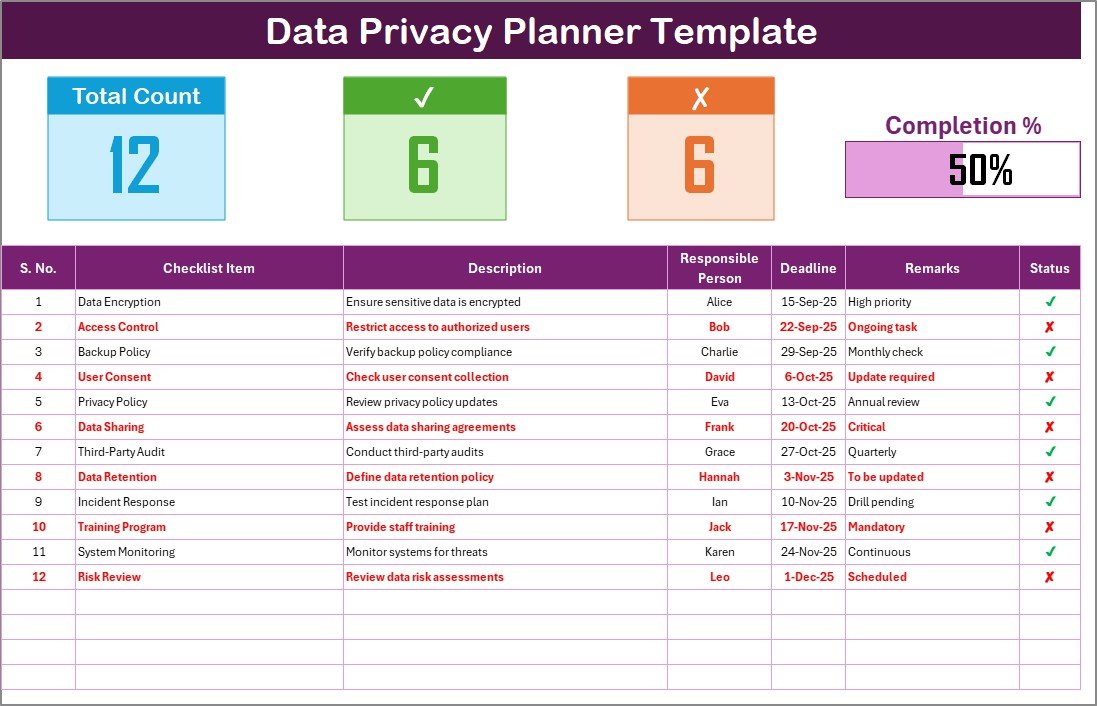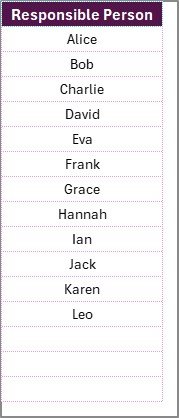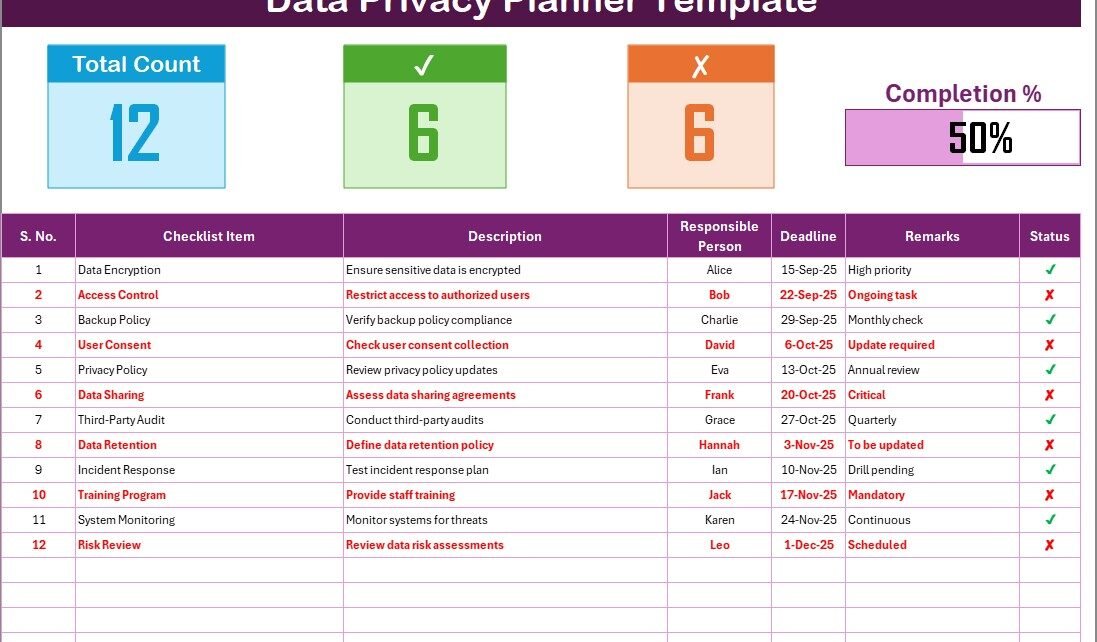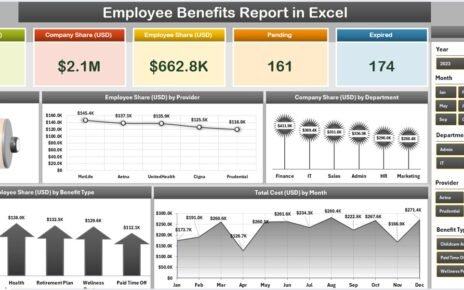In today’s digital world, data privacy is no longer optional—it is essential. Organizations of every size handle sensitive information about employees, customers, and business partners. Protecting this information builds trust, avoids legal risks, and ensures smooth operations. However, keeping track of compliance steps, audits, and security practices can feel overwhelming without the right tools.
This is where the Data Privacy Planner Checklist in Excel plays a vital role. With a well-structured checklist, businesses can monitor tasks, assign responsibilities, and track deadlines. An Excel-based template makes the process simple, efficient, and customizable for any industry.
Click to Purchases Data Privacy Planner Checklist in Excel
In this article, we will explore:
-
What the Data Privacy Planner Checklist is
-
Why it is important
-
Key features of the Excel template
-
Advantages of using a checklist approach
-
Best practices for using it effectively
-
Opportunities for improvement
-
Frequently asked questions
What is a Data Privacy Planner Checklist in Excel?
A Data Privacy Planner Checklist in Excel is a ready-to-use template designed to help organizations manage their data protection processes. It acts as a centralized tool where you can record every task related to data privacy—from reviewing consent policies to auditing access logs.
Instead of scattered notes or manual tracking, the checklist provides:
-
A clear view of what needs to be done
-
A status tracker to mark completed tasks
-
Assigned responsibilities for accountability
-
Deadlines to prevent delays
This structured approach ensures that no important step gets missed.
Key Features of the Data Privacy Planner Checklist Template
The Excel template comes with built-in features that make data privacy management easier.
Data Privacy Planner Checklist Sheet Tab

This is the main sheet where all checklist items are managed.
Top Section Overview:
- Total task count
- Completed task count
- Pending task count
- Progress bar that visually shows completion percentage
Checklist Table Columns:
- Serial No.: Keeps tasks in order
- Checklist Item: Main action or task
- Description: Short details of the task
- Responsible Person: The assigned staff member
- Deadline: Target date for completion
- Remarks: Additional notes
- Status: Marked with ✔ or ✘
This setup ensures full visibility into ongoing and completed tasks.
Click to Purchases Data Privacy Planner Checklist in Excel
List Sheet Tab

This sheet captures a unique list of responsible persons.
It is used to create drop-down options in the main checklist, which prevents errors and improves consistency when assigning tasks.
Why is a Data Privacy Planner Checklist Important?
Organizations today face increasing risks from cyberattacks, human errors, and regulatory non-compliance. Without a clear plan, they may:
-
Fail audits
-
Lose customer trust
-
Face heavy fines under laws like GDPR or HIPAA
A structured checklist ensures that:
-
Every privacy regulation is considered
-
Tasks are properly assigned
-
Progress is measurable
-
Teams stay accountable
With an Excel-based template, businesses can start immediately without investing in complex software.
Advantages of Using the Data Privacy Planner Checklist
Using an Excel-based checklist provides several benefits:
✅ Easy to Use
Anyone familiar with Excel can quickly navigate and update the checklist.
✅ Centralized Tracking
All tasks, deadlines, and responsibilities are in one place, reducing confusion.
✅ Visual Progress Indicators
The progress bar and counts make it easy to see how much work is done.
✅ Accountability
Assigned responsibilities ensure that every task has an owner.
✅ Customizable
Organizations can add or remove checklist items as per their unique needs.
✅ Cost-Effective
No expensive tools or training are required—Excel is already available in most workplaces.
How to Use the Data Privacy Planner Checklist Effectively
To get the best results, follow these steps when using the checklist:
-
Define Clear Goals:
Decide whether the checklist will focus on compliance audits, internal data protection, or customer data handling. -
Customize the Checklist:
Add tasks relevant to your organization. For example, healthcare companies can include HIPAA checks, while retailers may focus on PCI DSS compliance. -
Assign Responsibilities:
Use the drop-down list to allocate tasks to the right team members. -
Set Deadlines:
Ensure every task has a realistic deadline to maintain momentum. -
Update Regularly:
Review and update the checklist weekly or monthly to keep it current. -
Monitor Progress:
Use the progress bar to see how close you are to completion. -
Review Completed Tasks:
Conduct periodic audits to verify that tasks were done correctly.
Best Practices for the Data Privacy Planner Checklist
To maximize efficiency, consider these best practices:
-
Keep Tasks Specific: Write short, actionable checklist items.
-
Use Drop-Downs Wisely: Avoid manual text entry for responsible persons to reduce errors.
-
Set Clear Deadlines: Every task should have a realistic completion date.
-
Review Progress Periodically: Hold weekly meetings to discuss checklist updates.
-
Integrate with Other Tools: Link this checklist with audit schedules, compliance trackers, or training programs.
-
Ensure Accessibility: Store the file in a shared drive for easy access by authorized staff.
Opportunities for Improvement
Even though the template is powerful, organizations can further enhance it by:
-
Adding Automated Alerts: Use Excel VBA to send reminders before deadlines.
-
Linking Policies: Add hyperlinks to internal policies or legal guidelines for quick reference.
-
Creating Dashboards: Build charts and graphs that provide a real-time view of progress.
-
Integrating Security Measures: Protect the file with a password to prevent unauthorized edits.
-
Version Tracking: Keep records of past updates for audit purposes.
Conclusion
Data privacy is a critical responsibility for every business. The Data Privacy Planner Checklist in Excel provides a simple, structured, and cost-effective way to stay compliant and secure. By assigning responsibilities, setting deadlines, and tracking progress, organizations can ensure that no privacy task is overlooked.
Using this template is not just about compliance—it is about building trust with customers and protecting the future of your business.
Frequently Asked Questions (FAQs)
1. What is a Data Privacy Planner Checklist?
It is a structured list of tasks designed to help organizations manage and track data privacy responsibilities.
2. Why should I use an Excel-based checklist?
Excel is simple, widely available, and customizable. It allows teams to start quickly without investing in expensive tools.
3. Can I customize the checklist for my industry?
Yes. The template is fully customizable, so you can add tasks specific to regulations like GDPR, HIPAA, or PCI DSS.
4. How often should I update the checklist?
At least once a week or whenever there are changes in regulations, policies, or team responsibilities.
5. Who should use this checklist?
IT managers, compliance officers, HR teams, and business owners can all use it to ensure data privacy compliance.
6. Does the checklist track progress automatically?
Yes. It includes counts and a progress bar that updates as you mark tasks with ✔ or ✘.
7. Can I share the checklist with my team?
Yes. You can store it on a shared drive or cloud system so authorized staff can access and update it.
8. Is the template secure?
You can protect the Excel file with a password and grant editing rights only to selected team members.
Visit our YouTube channel to learn step-by-step video tutorials



